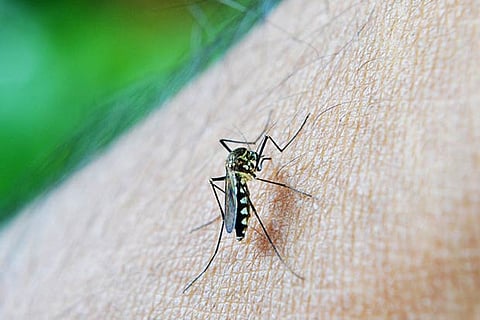

New York
Critical behaviours exhibited by the species, such as feeding, egg-laying and flying, are time-of-day specific, including a greater propensity for night-time biting.
While insecticide-treated bed nets and walls have helped prevent bites and reduce malaria, mosquitoes are adapting to preventive conditions, leaving adults and children vulnerable in the early evening and early morning hours -- when they are not under the nets or in the house.
“We need to discover new methods to address mosquito control and prevention. The systems and tools we currently have including global distribution and usage of insecticide-treated bed nets and spraying are not enough,” said Giles Duffield, Associate Professor at the University of Notre Dame in Indiana, US.
The findings, published in the journal Parasites and Vectors, suggests that light can be used to manipulate mosquitoes, thereby offering a potential novel solution to preventing bites and reducing malaria. For the study, Duffield and his team tested the mosquitoes’ preference to bite during their active host-seeking period by separating them into multiple control and test batches. Control mosquitoes were kept in the dark, while test batches were exposed to a pulse of white light for 10 minutes.
Researchers then tested the propensity of the mosquitoes to bite immediately after the pulse and every two hours throughout the night, holding their arms to a mesh lining that allowed uninfected mosquitoes to feed while remaining contained.
Results indicated a significant suppression. In another experiment, mosquitoes were pulsed with light every two hours, and using this multiple pulse approach the team found that biting could be suppressed during a large portion of the 12-hour night.
“Most remarkable is the prolonged effect a short light treatment has on their preference to bite, with suppression lasting as long as four hours after the pulse,” Duffield said.
“This may prove to be an effective tool that complements established control methods used to reduce disease transmission,” Duffield added. Pulses of light would probably be more effective than constant exposure, Duffield said, as the mosquitoes would be less likely to adapt to light presented in periodic doses. The research team is testing the effectiveness of different wavelengths of light, such as red light, that would be less disturbing to adults and children while they sleep, with an aim towards developing field-applicable solutions.
Visit news.dtnext.in to explore our interactive epaper!
Download the DT Next app for more exciting features!
Click here for iOS
Click here for Android